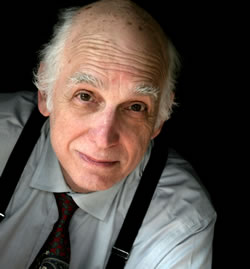|
As a public television producer and director for 50 years, I almost always had to write my own shows, or at least edit someone's else script and make it work for me. I had a Pulitzer-prize winning journalist brother and a novelist wife, so I didn't want to try anything like a novel, short story, or magazine article. It wouldn't be good enough, I figured, so why try?
In 1981, however, I took a full-time position as professor at the City College of New York and that gave me summers off. How could I not try writing? What would I do with my summers otherwise? The first four published books were non-fiction, but I also tried writing one or two novels. They were dismal failures. The next two non-fiction books used some of the valuable ideas I'd learned from the failed novels, but they were still not "art," not flowing, gracious language—the kind of sentences and paragraphs I loved in Thomas Wolfe, Faulkner, or Virginia Woolf.
Then a peculiar thing happened. Before falling off to sleep, or in the car, or in the shower—I found myself composing the first lines of novels. They kept coming to me, by the dozens. I put some of them down on paper (or, when I got a computer, into that machine) and enjoyed the game of invention.
Where did these words come from? I am a firm believer in the Unconscious—that repository of half-formed emotions, ideas, and impulses that rise up when we least expect them, in bed, bath, or car. Sentences and surreptitious ideas come into one's head almost magically; then it's up to the writer's fingers to turn them into elegant phrases and pages rich with fertile promise.
Twenty years later, with hundreds of "beginnings" in my head, I wondered if there was any way they could be used. I had been unable to fashion them into novels, but maybe others could.
What follows is the preface to a book, A NOVEL IDEA, which eventually became "59 Approaches to the Novel" which, in a different form, won second place in a recent Glimmer Train competition. I thought the volume might be useful for young students who don't know where to get started. I thought if they had that book they could use my beginnings and go on to a middle and an end (which I didn't seem able to do) or realize that almost any idea in one's head could be a beginning; the important thing about writing is to begin.
Here's the preface to that book:
On the theory that one idea begets another, here are the first lines of fifty novels (or short stories), intended for those would-be writers who have a good idea for the middle or end of a story, but just can't get to the beginning. Or, for that matter, for those who have no idea what to write about and just need a goose.
"Writer's block," fear of starting something you can't finish, sheer laziness? Here are some beginning sentences to get you off and running.
My wish is that these words provide fodder for creative spirit and output. On the other hand, I hope you don't take these words, sentences and paragraphs verbatim. They are merely intended to spark something in you, allowing you to take my meager beginnings and make something personal and valuable for yourself.
Sometimes these beginnings come in dreams or from past experience; more often they come from that wellspring of creativity we all possess: the "little grey cells", as Hercule Poirot called them. Of course, he came from the little grey cells of Dame Agatha Christie.
**
I'm still writing non-fiction, still doing occasional films, but I have also started a new novel. I may have had a myriad of juicy beginnings in me, but I still yearn for a middle and an end. Years ago, my wife told me that I should let my unconscious and my fingers do the writing. As a maker of documentaries, I always figured it should be my mind that did it, but now I have begun to believe that she was right: the same unconscious that gave me those 59 paragraphs can instill in me characters and stories that make a book sing.
This new novel may or may not find publication. But I'm learning. In two years I will be 80 years old. Maybe by then my muse will have come home.
| 

